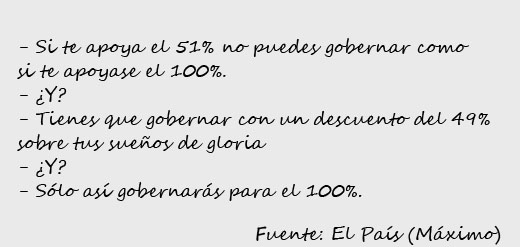OUTBOARDING/ Alberto Andreu Pinillos
Great leaders basically do four things: propose a project of illusion; manage trust; manage "the politics"; and identify the nature of the problems.
These are not times for lesser leaders. When things are going well, anyone who does not make too many mistakes is fine, because the worst thing that can happen is to miss opportunities for improvement. But when things get difficult, when you have to face a serious problem, one of those where your life is at stake, then it is no longer enough to be a leader ; you have to know how to be a leader and know how to take a step forward.
Throughout my professional life, in which I have had the good fortune to meet people of great stature, I have seen that great leaders are those who basically do four things: propose a project of illusion; manage trust; handle what is usually called "politics"; and know how to identify the nature of each problem. Let's find out how.
Let's start with project. As a general rule, good leaders are capable of summarizing a complex project into a powerful idea, into a transforming purpose . In politics, Winston Churchill did it with his historic promise to fight Nazism: "I have nothing to offer but blood, toil, tears and sweat". Martin Luther King did something similar with his I have a dream, to call for the freedom of the African-American community in the United States. And in the world of business, Steve Jobs did it, with his Think Different, to say that Apple offered a different way of understanding technology. There are many examples... but they all have a common thread: a strong idea for a complex and exciting project .
Let's continue with the management of trust. Far from what some people think - that trust is something intangible, based on feeling staff- trust in the professional world, and in life in general, is perfectly tangible and manageable. To do this, you have to do a few things, but clearly: achieve results; honor your word; fulfill your commitments; be transparent in your processes; do things reasonably well; behave honestly; and, above all, do not abuse the trust that others place in you. At final: in public and professional life, the same criteria apply as at staff: we trust those people who do not fail us and who do not deceive us. It is as simple as that.
And now let's move on to the management of politics. In 1927, Ortega y Gasset defined the politician in a masterful way. For him, a politician is someone who has the natural intelligence and the instinct to reconcile the irreconcilable. I will not be the one to interpret Ortega, but, to understand each other, managing politics in any organization is nothing more than reconciling conflicting legitimate interests. And for that you have to know how to listen; to understand the dilemmas of the other; to renounce the adjective; to manage enemies; not to win by a landslide, to concede victories to the rival; not to go so fast that, in the desire to run faster, unity is broken; to define a common road map and respect it; to agree on the points of agreement (and those of disagreement); and, above all, never to break personal bridges and always to leave some doors open.

In a magnificent cartoon by Máximo, published many years ago in El País, with which I open this article (and which I have had framed on my desk for some time) these qualities were very well captured. In that cartoon, we read this dialogue between two countrymen wearing their respective berets (to reflect, I understand, the popular wisdom):
- If only 50% support you, you can't govern as if 100% support you," said one of them.
-And?" answered the other one.
- You have to rule with a 49% discount on your dreams of glory," the first replied.
- And? - the second one answers again
- This is the only way to govern for 100%," said the first one.
At summary: managing politics is nothing more than giving up part of your aspirations to integrate part of those of others.
And let's finish by talking about the identification of the nature of the problems. Although this may seem a minor topic , it is clear to me that identifying the nature of the problems is as fundamental for a leader as it is for a doctor to have a good diagnosis of the disease. A good diagnosis offers you the right treatment; a good identification of the problem, financial aid will help you make the right decisions and avoid falling into "occurrences".
Experience has taught me that there are common patterns of errors in identifying problems. The first is to confuse management problems with communication problems; many (bad) leaders, incapable of self-criticism and of recognizing their own management. mistakes, tend to blame communication; and they do not realize that facts communicate more than words. Another common mistake is to blame the lack of transversal partnership on poor personal relations, when, as a general rule, this problem is due to the existence of organizational silos created by the control systems of management, incentives, budgeting and resource allocation. Finally, another typical failure is to think that changing (or dismissing) people fixes the problem, instead of thinking that, if the ways of doing things are not changed, whoever you put in that position will fail.
This is my vision of the leaders we need today. It is not an appeal to anyone in particular. It is a call to everyone in general. The challenge facing the world and Europe, in general, and Spain in particular, is so immense that we had better have leaders with official document and the capacity to move forward. Otherwise... I prefer not to think about it.